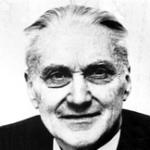Ragnar Frisch

Ragnar Frisch (March 3, 1895 – January 31, 1973) was a Norwegian economist and the co-winner with Jan Tinbergen of the first Nobel Prize in economics 1969 economics “for having developed and applied dynamic models for the analysis of economic processes.” Frisch received his prize for his pioneering work in econometric modeling and measurement; indeed, Frisch invented the word “econometrics” to refer to the use of mathematical and statistical techniques to test economic hypotheses. Frisch was one of the founders of the Econometric Society in 1930.
Frisch was one of the founders of economics as a modern science. He made a number of significant advances in the field of economics and coined a number of new words including econometrics and macroeconomics. In a paper on business cycles, Frisch was also the first to use the words “microeconomics” to refer to the study of single firms and industries, and “macroeconomics” to refer to the study of the aggregate economy.
In econometrics he worked on time series (1927) and linear regression analysis (1934). His 1933 work on impulse-propagation business cycles became one of the principles of modern New Classical business cycle theory. He also helped introduce econometric modeling to government economic planning and accounting. He was one of the initiators of the Econometric Society and editor of Econometrica for over twenty years. The Frisch Medal, so named in his honor, is given every two years for the best paper published in the aforementioned Econometrica in the previous five years.
Frisch believed that econometrics would help establish economics as a science, but toward the end of his life he had doubts about how econometrics was being used. “I have insisted that econometrics must have relevance to concrete realities,” he wrote, “otherwise it degenerates into something which is not worthy of the name econometrics, but ought rather to be called playometrics.”
http://www.nobelprize.org/nobel_prizes/economics/laureates/1969/